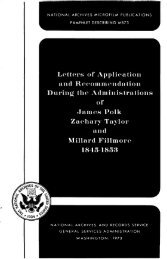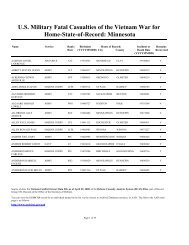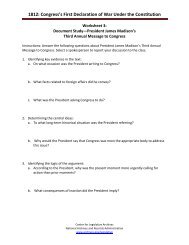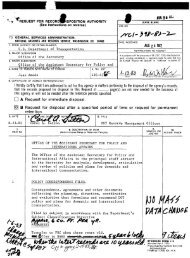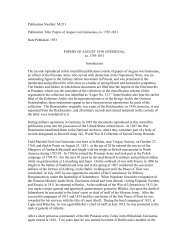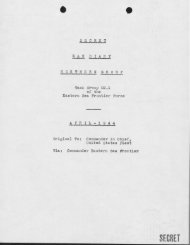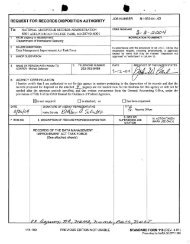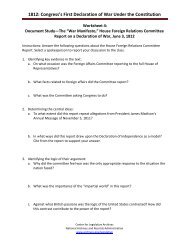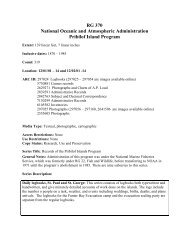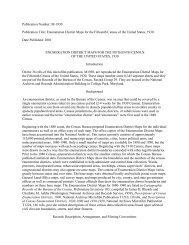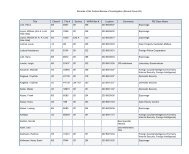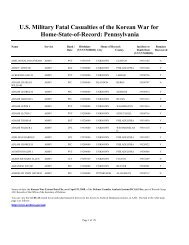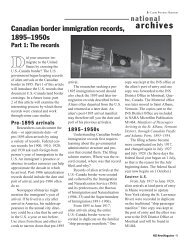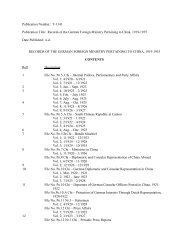HITLER'S SHADOW - National Archives and Records Administration
HITLER'S SHADOW - National Archives and Records Administration
HITLER'S SHADOW - National Archives and Records Administration
Create successful ePaper yourself
Turn your PDF publications into a flip-book with our unique Google optimized e-Paper software.
Intelligence War Room in London asked Allied forces in the field to learn from<br />
captured Reich Security Main Office (RSHA) members what instructions they had<br />
been given for continued activity after Germany’s defeat. In the weeks ahead the<br />
War Room learned that important Gestapo officials had concentrated around Hof<br />
near Munich, Salzburg, <strong>and</strong> Innsbruck in the war’s final days. 2 On May 30, 1945,<br />
the 80th CIC detachment in the Austrian Alps captured Mildner, a senior Gestapo<br />
official. He claimed that he was climbing for recreation <strong>and</strong> that he had intended to<br />
surrender to the Americans. 3 It was the first of many misrepresentations.<br />
A native Austrian with radical rightist sympathies, Mildner received a law degree<br />
in 1934. In July of the same year, the illegal Austrian Nazi movement assassinated<br />
Chancellor Engelbert Dollfuss. Afterwards, Mildner fled Austria for Munich. Reinhard<br />
Heydrich, then head of the Gestapo, hired him to investigate other Austrians who<br />
had crossed into Germany to determine who was reliable. Mildner later claimed that<br />
Heydrich forced him to remain in the German police, but Heydrich would not have<br />
trusted a reluctant officer for such duty. Mildner, in fact, became deputy chief of the<br />
Gestapo in Linz, Hitler’s hometown, after Germany annexed Austria in March 1938. 4<br />
U.S. authorities knew that Mildner was a long-st<strong>and</strong>ing Gestapo member<br />
but never pressed him for details on the Gestapo’s crimes against Jews or anyone<br />
else. Mildner simply misled them. In discussing his functions late in the war as<br />
acting chief of Vienna’s Security Police, he mentioned that he left untouched<br />
Vienna’s remnant of 15,000 Jews. 5 He hardly deserved credit. Nazi authorities<br />
never decided what to do with Jews in mixed marriages in Germany owing to<br />
“Aryan” partners’ reactions, which included a major protest in Berlin in February<br />
1943. 6 But U.S. Army Capt. Andrew R. Pickens found Mildner cooperative <strong>and</strong><br />
possessing a good memory. The War Room told the CIC that “it is not thought<br />
that his information of Amt IV [Gestapo] is likely to be of outst<strong>and</strong>ing interest<br />
as it seems probably that his service at the RSHA was merely marking time.” 7<br />
Mildner left out large parts of his career. As head of the Jewish section of the<br />
Vienna Gestapo from 1941–43, he signed orders confiscating the property of some<br />
10,000 Viennese Jews deported to Auschwitz. 8 As Gestapo chief in Katowice in East<br />
Upper Silesia from 1941 to 1943, he was responsible for the execution of hundreds,<br />
if not thous<strong>and</strong>s, of suspected Polish resisters. Mildner gave them one-minute<br />
“trials” in the infamous Block 11 of Auschwitz concentration camp that resulted in<br />
shooting or hanging. He came to Auschwitz frequently for this purpose. 9<br />
36 | New Materials on Former Gestapo Officers



